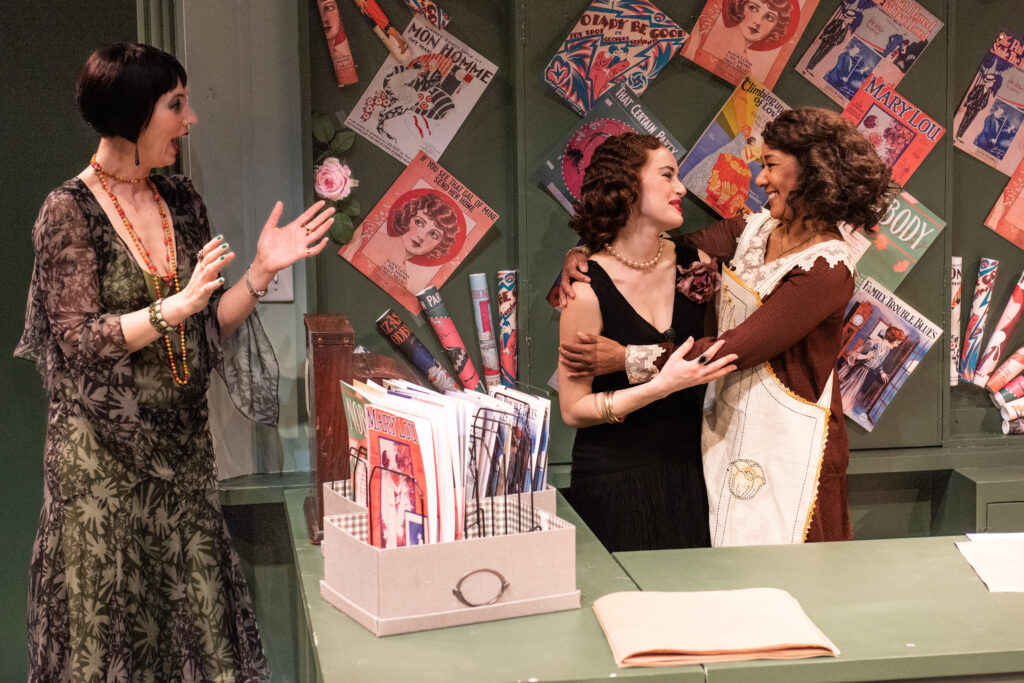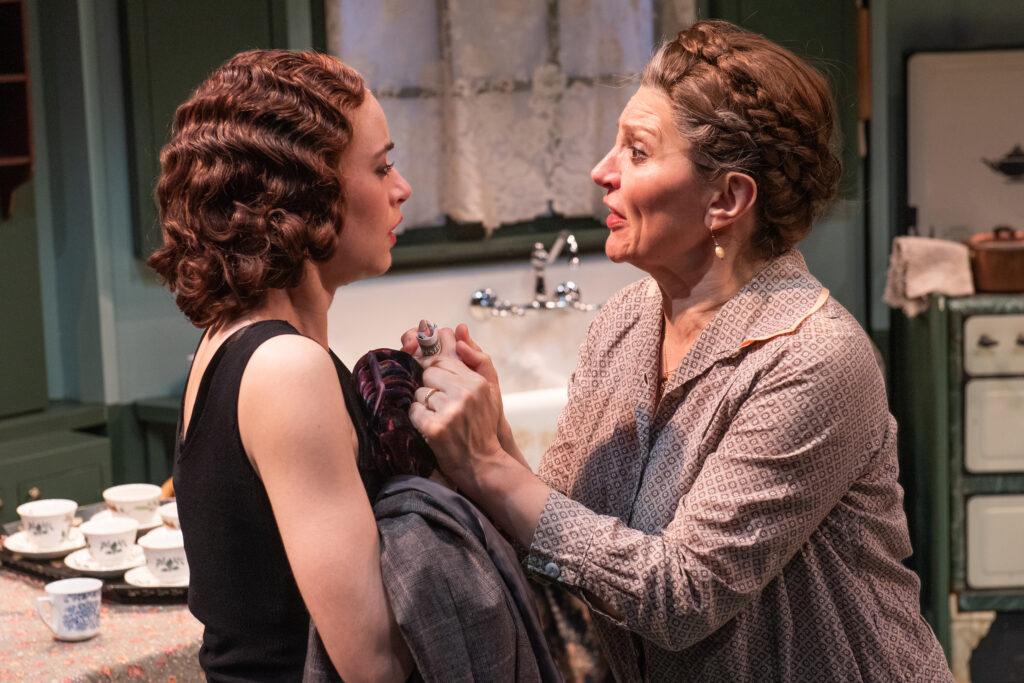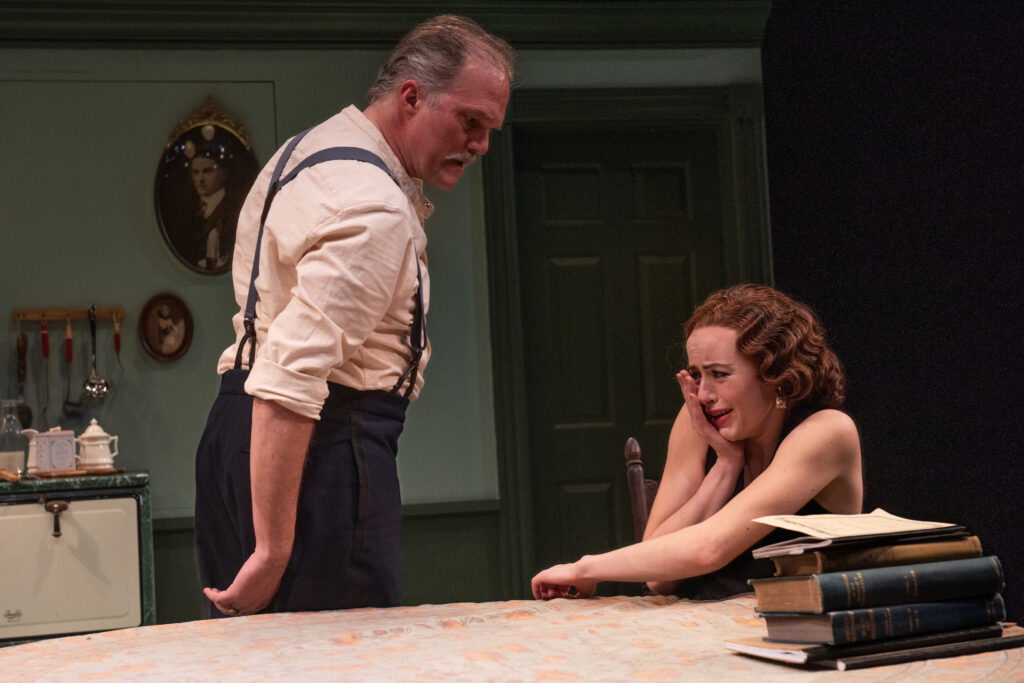By Ron Fassler . . .
Author Betty Smith (1896-1972) is best known for her classic (and never out-of-print) 1943 novel A Tree Grows in Brooklyn. A heartbreaking story, largely autobiographical, it tells of a young girl’s coming of age in 1912 Brooklyn. Critically acclaimed for her first attempt at the form, it’s little known that Smith had spent the 1920s and 30s as a struggling playwright. Theatre was her first love and remained so until she died.
The Mint Theatre, which specializes in unearthing heretofore unknown or unseen early American theatre, has come up with a winner in producing Smith’s Becomes a Woman, now playing at the New York City Center Stage II. Never published or produced, this lost play is shockingly of the moment, even though it takes place one hundred years ago. Sad that many of the issues it tackles are still problematic for women today, but society’s loss is theatre’s gain, as it showcases in fine detail the timelessness of its theme in a well-acted and well-directed production.

The story takes place in Brooklyn in the 1920s and concerns a nineteen year-old woman, Francie Nolan (Emma Pfitzer Price, outstanding), who is living with her parents and two younger brothers in a small house in Bushwick. Bright and ambitious, Francie is seemingly out of place not only in her own home but at work at Kress’s Dime Store, which is where Act One takes place. Based on the real-life S.H. Kress & Co, once one of America’s largest five-and-ten-cent chains, Francie is a song-plugger. Now a defunct profession, it used to be when vocalist or piano player (or both) were employed by department stores and music stores to demonstrate what a song sounded like to entice potential sheet music buyers.
The drama opens with Francie singing, a moment that book ends nicely with a song she sings at the play’s end after life has thrown her some very difficult curves. Fending off advances from men charmed by her singing, we see Francie rebuff a trio of would-be-suitors only to succumb to the charms of Leonard (Peterson Townsend, suitably slick) who turns out to be the son of Mr. Kress himself, the owner of the chain that employs her.


Act Two takes place in Francie’s home, where we meet her policeman father (Jeb Brown, properly terrorizing) and her homemaker mother (Antoinette LaVecchia, pitch-perfect). Awaiting Leonard’s arrival to be judged appropriate as someone for their young daughter, the tension in the air is thick and problematic. Matters come to the fore during the father’s interrogation of Leonard, which reveals that Francie is pregnant. This is when the drama leaps into high gear and its third act becomes a fraught situation.


Act III introduces a new character, Leonard Kress Sr. (Duane Boutté, strongly convincing), that heightens the class and sexual distinctions that have simmered throughout the play. “Must whether men want me or not be the only reason for my happiness?” Frankie asks.
Britt Berke has done a fine job in letting the play breathe throughout its two-and-a-half hour running time. The staging is excellent, and the actors are skillfully handled. It’s hard to believe this is the first production of Becomes a Woman ever staged, as the flow of the piece doesn’t feel as if it has been encased in mothballs at all. It’s shockingly contemporary even with the lengths its designers have gone to assure the scenery, props and costumes make it feel every bit we’re in the 1920s. Credit to Vicki R. Davis (set), Emilee McVey-Lee (costumes) and Mary Louise Geiger (lights).
Mention should also be made of other members of the cast integral to the success of this production. Gina Daniels has some very touching moments as Francie’s one true friend, and as her suitor, Jason O’Connell brings a deft comedic touch and genuine pathos in his two brief scenes. He has the demeanor and talent of a Warner Bros. stock player of yesteryear (and that’s a high compliment). Phillip Taratula also excels as two characters that he differentiates expertly.
When someone in the play mentions to Francie that she’s now twenty, they say “The first thing you know you’ll be quite a woman,” to which Francie responds, “I have become a woman.” It’s a small moment, but its resonance rings loud and clear. Becomes a Woman is a lovely sort of play that no one writes anymore. There’s no reason not to present plays from the past like this (or even write them now), even if they possess a whiff of melodrama. So what? It’s wrong that melodrama is derided as unreal or unworthy of an audience’s time. Done well, as it’s done here, is a compelling reason to do them. And what a pleasure to see a cast of fifteen lined up at the curtain call. More power to the Mint and other producing entities that are fighting the good fight.
Becomes a Woman. Through March 18th, New York City Center Stage II (131 W 55th Street between Sixth and Seventh Avenues). 150 minutes, two intermissions. https://minttheater.org
Photos: Todd Cerveris
Featured Image: Emma Pfitzer Price


















